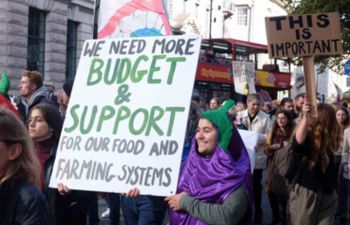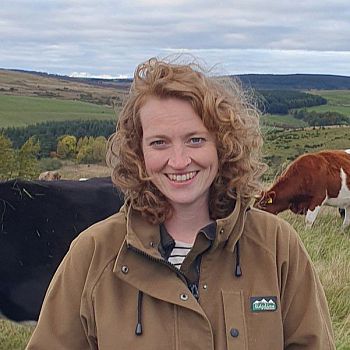Women as leaders in land-based transformations
Posted on behalf of: Dr Rachael Durrant
Last updated: Tuesday, 19 November 2024

Members of the Landworkers Alliance marched in London in 2022 to demand food and climate justice. Image credit: Steph Wetherell (with the permission of the Landworkers' Alliance).
Over the past few decades an emergent social movement – a movement of movements – has been forging new connections between social justice, food, land, and ecology in Britain and beyond. At the core of this movement are concerns with inequality, injustice, and the oppression of people and nature within capitalist systems.
These systems control access to and distribution of food and land, bestowing extreme privilege to some, whilst depriving others of even a modest share. Viewed from the perspective of those who have less or ‘have-not’ – who are more commonly found amongst people of colour, women, working-class, and migrant communities, among others – these arrangements are deeply alienating. But people have started to organise against them, forming campaigns, networks, and organisations; holding gatherings to inspire, learn and protest.
Activist happenings such as these are emerging slowly into an already crowded arena of civil society and social movements, building on a long history of popular mobilisation on the issues of food, land, and nature - see ‘From rural revolt to the values of our time’ for more detail on this.
Women at the helm
Many of the most prominent civil society and social movement organisations working in this space either are, or have recently been, led by women. The National Farmers’ Union’s Minette Batters and the Soil Association’s Helen Browning are great examples. Sustain, the Landworkers’ Alliance, Ecological Land Cooperative, Real Farming Trust, The Gaia Foundation and more, have all also recently had women leaders.
Even some of the largest, most influential membership organisations in the wider policy space (e.g., the National Trust, the Royal Society for the Protection of Birds and World Wildlife Fund - UK) had women at the helm in recent times.
Female farmers
The UK government has been gathering data about farm holdings, including the gender of farmers, for decades, and this data shows there has been a dramatic increase in the visibility of female farmers in recent years too. Although this data conceals the fact that women have always held important roles in farming, it reveals important changes in the kinds of roles they play.
Within traditional farming communities, customs of inheritance that ensure farms are passed down the male line, and gendered divisions of labour within which men play official and public facing roles, have historically made female farmers invisible. But this is gradually shifting.
Food-grower activists
What is particularly interesting to me is the possibility that the two trends (more women in farming and more women leading food and farming organisations, including those tackling injustice) could be entwined, since some of the most well-known women leaders are also farmers, growers or landworkers themselves.
In fact, the staff and membership of organisations from the grassroots level to the more ‘establishment’ wing of the movement are packed full of female food-grower activists: women who both work the land and campaign for change to food and agricultural systems towards greater social equity and ecological sustainability.
... and activist farmers
There are also many more women farmers and growers who aren’t connected to movement organisations, but are nonetheless agitating for change in other ways. Whether it be through posting on their social media, hosting podcasts, appearing on the many TV and radio shows that cover farming in Britain, or publishing books about their experiences – go to the end of this post for a few examples of memoirs by female farmers and growers in Britain.
Although many of these women focus their activism on issues other than gender, some – such as Cumbrian shepherdess, Hannah Jackson and Grampian grazier, Nikki Yoxall – are using their voices to make explicit calls for gender justice in food, farming, and access to land, whilst others have devoted their attention to intersectional inequalities within the food system and beyond.

Regenerative farmer Nikki Yoxall is an ambassador for the Soil Association Scotland, conducts research for Pasture for Life, and runs events under the banner of ‘Regenerative Women on the Land’. Image credit: Nikki Yoxall.
Spaces of connection
As well as providing a space for women and people of other genders to gather together under a single umbrella, the Landworkers’ Alliance also supports a number of restricted working groups that aim to provide safe spaces for people from marginalised backgrounds to connect with each other and advance their concerns.
For instance, 'Racial Equity, Abolition and Liberation in Landwork', 'Women and Diverse Genders in Forestry and Landwork', and 'Out on the Land', provide spaces of connection specifically for people of colour, women and “LGBTQIA+ folx”, who work the land.
Call for action
The following abridged excerpt, taken from the Landworkers' Alliance introduction to its 'Food In Our Hands' campaign (2022), articulates the critique and call for action at the core of their activism:
"The dominant economic model that shapes the food system in the UK and beyond is inherently violent. This is because its foundations were built with the intention of pursuing profit and enhancing corporate control rather than actually feeding people ... In the UK, the political and social narrative on food justice remains frustratingly limited to merely increasing the provision of food banks.
What we lack is a cohesive movement to bring us all together and contextualise our current food system against a backdrop of capitalism, colonialism, and the multiple forms of oppression upon which it feeds.”
Check out the full 'Food In Our Hands' introduction and the LWA's film 'In Our Hands' to learn more.
An eco-feminist movement?
Despite being picked up by the media in recent years, the increasing presence of women within these movements and the leading roles that they play as ‘activist farmers’ or ‘food-grower activists’ have not been explicitly attended to by formal academic research. It is into this space that I am therefore curiously and cautiously treading, with the intention of generating some new insights.
My hope is that by working on this enquiry in dialogue with such women, we can start to explore how and under what conditions this new ‘eco-feminist’ movement might help to reconfigure long-established (and oppressive) patterns of relating between people and nature in contemporary Britain.
Resources
Gray, E. (2021). My Farming Life: Tales from a Shepherdess on a Remote Northumberland Farm. United Kingdom: Little, Brown Book Group.
Owen, A. (2021). Tales From the Farm by the Yorkshire Shepherdess. United Kingdom: Pan Macmillan.
Jackson, H. (2021). Call Me Red: A Shepherd’s Journey. United Kingdom: Ebury Publishing.
Colville, Z. (2023). The Chief Shepherdess: Lessons in Life, Love and Farming. United Kingdom: Transworld.
Cassells, L., Baer, S. (2022). Our Wild Farming Life: Adventures on a Scottish Highland Croft. United Kingdom: Chelsea Green Publishing.
Ratinon, C. (2022). Unearthed: On Race and Roots, and how the Soil Taught Me I Belong. United Kingdom: Random House.
Langford, S. (2022). Rooted: Stories of Life, Land, and a Farming Revolution. United Kingdom: Penguin Books Limited.
Vincent, A. (2023). Why Women Grow: Stories of Soil, Sisterhood and Survival. United Kingdom: Canongate Books.

